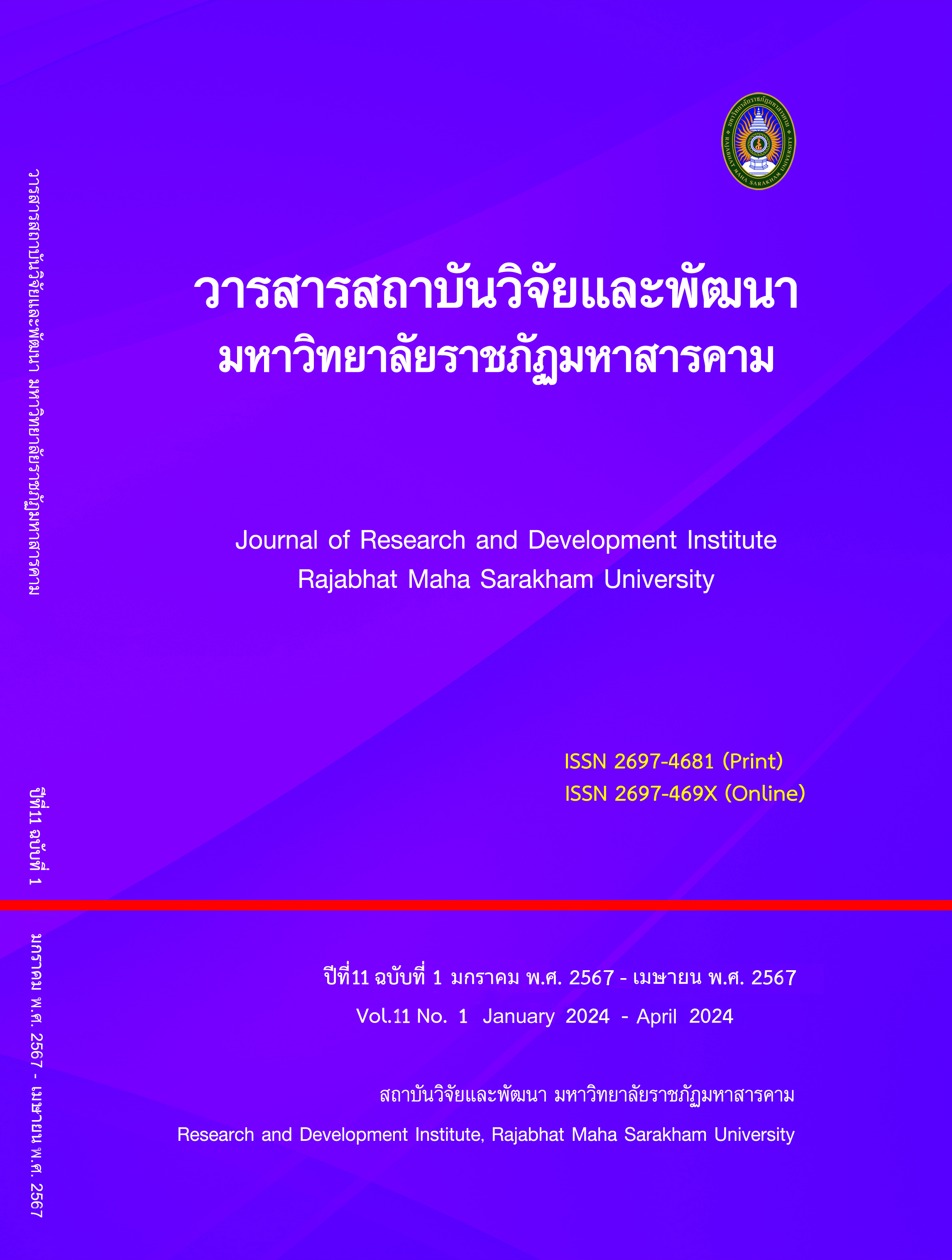The development of grade 5 students’ reading comprehension using gamification within brain-based learning.
Keywords:
reading comprehensionability, brain-based learning, gamificationAbstract
The aims of this study were to 1) develop the students’ reading comprehension using gamification within Brain-based learning (BBL), 2) explore the students’ opinions regarding their attitude towards this instruction, and 3) find the relationship between the student’s reading comprehension ability and the student’s opinions toward this instruction. The participants were 24 of grade 5 students selected by using purposive sampling. The methodology was pre-experimental research involving a one-group pretest-posttest design. The research instruments were 6 lesson plans, the reading comprehension pre- and post-test, the questionnaire, and the semi-structured interview. The relative gains scores were used to compare the students’ progression in reading comprehension. The Pearson correlation was employed to find the relationship between the post-test scores and the questionnaire scores. Furthermore, thematic analysis was used for analyzing the interview result to gain in-depth details of the student’s opinions.
The results of this study revealed that the mean scores of reading comprehension increased from 11.17 to 23.38 after using this intervention. The average progression gain score was 42.93 indicating that students had moderate progression. Meanwhile, this intervention enhanced students developing reading ability. Additionally, the questionnaire results showed that students had positive opinions toward this intervention. Additionally, the interview results also showed that this instruction can improve vocabulary knowledge reading comprehension , and create motivation. Furthermore, the correlation between reading scores and students' opinion scores is significantly related. In conclusion, all findings prove that this intervention is an effective way to improve reading ability and promote positive attitudes toward learning English.
References
Buhagiar, T., & Leo, C. (2018). Does Gamification Improve Academic Performance? Journal of Instructional Pedagogies, 20.
Castro, R. B. (2019). The Effects of Using Gamification in Enhancing the Medical Vocabulary Learning of English III Nursing Students at a Private University in Nakhon Pathom.Christain university Journal, 25(1), 46-62.
Chanthalat, K., Suvanasri, N., & Posrie, R. (2020). Learning management through BBL and mind map to improve reading comprehension in English of grade 6 students at the Xienghon secondary school, Valaya Alongkorn Review, 10(3), 19-34.
Darasawang, P. (2007). English language teaching and education in Thailand: A decade of change. Cambridge Scholars Publishing.
Eladl, A. M., & Saad, M. A. E. (2019). Effect of a Brain-Based Learning Program on Working Memory and Academic Motivation among Tenth Grade Omanis Students. International Journal of Psycho-Educational Sciences 8(1), 42-50.
Göksün, D. O. and G. Gürsoy (2019). "Comparing success and engagement in gamified learning experiences via Kahoot and Quizizz." Computers & Education.
Hamari, J., Koivisto, J., & Sarsa, H. (2014). Does gamification work? a literature review of empirical studies on gamification. 2014 Hawaii International Conference on system sciences,
Jensen, E. (2008). Brain-based learning: The new paradigm of teaching. Corwin Press.
Kapp, K. M. (2012). The gamification of learning and instruction: game-based methods and strategies for training and education. John Wiley & Sons.
Kaensige, A. L. and M. Yohansa (2018). The use of the class123 application as an attempt to improve grade 12 science students’ behavioral engagement in a high school. Journal of Holistic Mathematics Education 2(1): 57-70.
Khanthap, C. and S. Bhiasiri (2012). "The Development of English Reading Skill By Using Brain-Based Learning Of Grade 4 Students " Journal of Education Khonkaen University 35(3): 9-14.
Kohar, d. (2019). "Examining the effectiveness of reading comprehension practice via brain-based learning model at SMPN Unggulan Indramayu." advannces in social science, education and humanities research 429(1): 146-149.
Khieosawat, N., Suratreungchai, V., & Thongsorn, P. (2021). The learning outcome using brain-based learning and scaffolding strategy for developing English reading comprehension skills of Prathomsuksa 6 students. Journal Of Education Naresuan University, 23(3), 371-381.
Ling, L. T. Y. (2018). Meaningful Gamification and Students' Motivation: A Strategy for Scaffolding Reading Material. Online Learning, 22(2), 141-155.
Nitsaisook, M. (2003). An analysis of Thai students' EFL reading performance and ability development. Journal of Science Technology and Humanities, 1(1), 77-89.
Sawaengkit, J., Phongploenpis, S., & Mahimuang, S. (2020). Effects of Gamification Techniques on Improving Grade 8 Students’Classroom Engagement at Boriboonsilp Rangsit School. Education and Communication Technology Journal, 15(19), 33-43.
Sornprasert, S., & Chusanachoti, R. (2019). Development of a Reading Instructional Model Based on the Schema Theory and Reciprocal Teaching Approach to Enhance Reading Ability of Upper Secondary School Students. Journal of Education Studies, 47(1), 429-449.
Talungjit, M., Jaiman, P., & Thammachat, S. (2019). The Instruction Model Based on Brain Based Learning to Enhance Reading Literacy and Communicate for Students in Secondary School. Journal of Education Thaksin University, 19(2).
Wang, A. I., & Tahir, R. (2020). The effect of using Kahoot for learning A literature review. Computers & Education, 149
Downloads
Published
How to Cite
Issue
Section
License
Copyright (c) 2024 ณัฐพร ไทยานนท์, Ong-Art Namwong, Roderick Julian Robillos

This work is licensed under a Creative Commons Attribution-NonCommercial-NoDerivatives 4.0 International License.
Articles that are published are copyrighted by the authors of the articles







